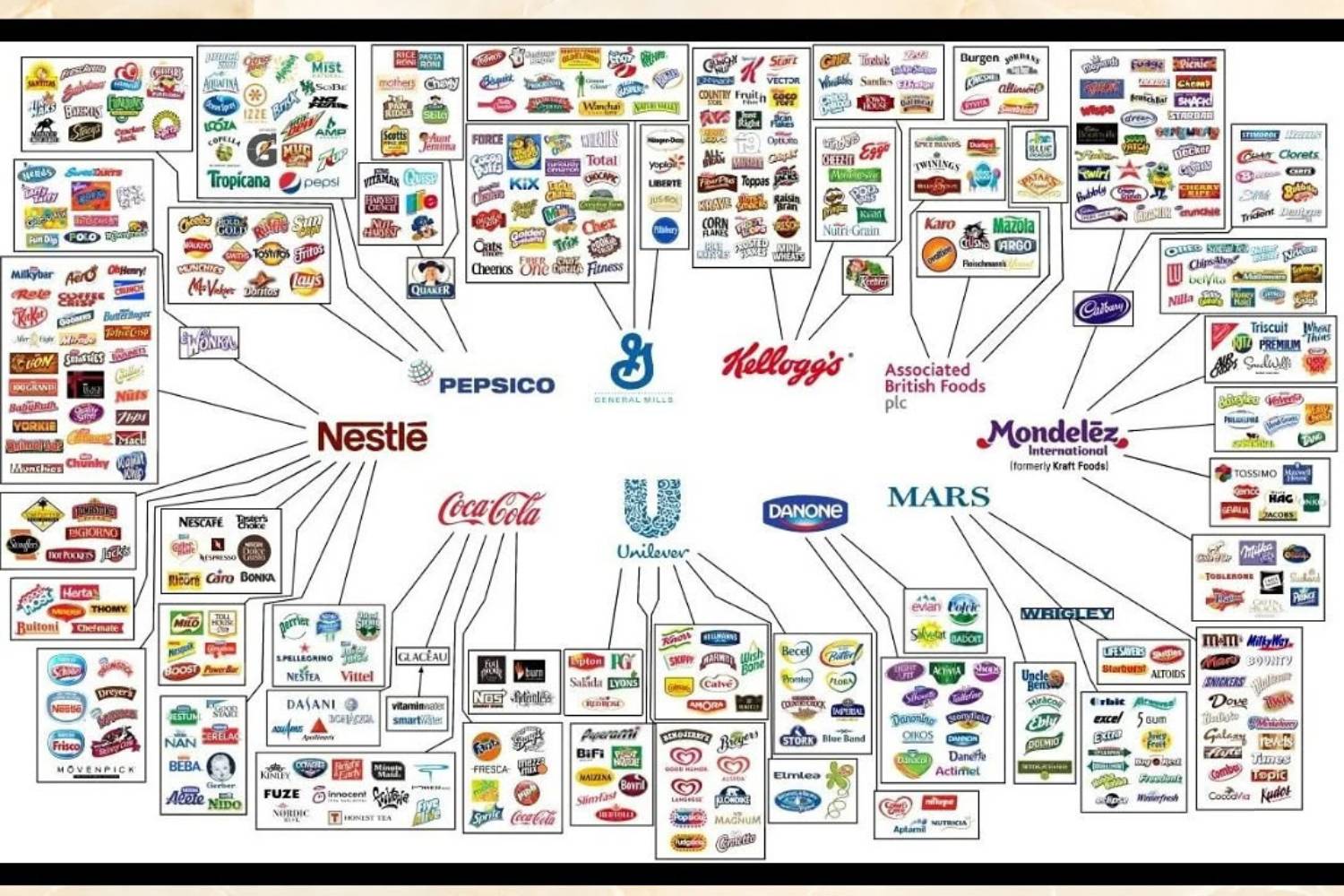The global food market is dominated by ten multinationals that control the majority of food and beverage brands sold in the world. This concentration of power reduces the real diversity of the offer, affecting prices, consumer health and environmental and social impact throughout the supply chain

@Oxfam
Table of contents
Despite what appears to be a wide variety of brands on grocery store shelves, most of the food and drinks we consume daily are controlled by just a handful of multinational corporations. According to an analysis by Business Insider based on data from Oxfam, just ten companies dominate the global food and beverage market, owning hundreds of popular brands worldwide.
The 10 food giants that secretly own your supermarket
Nestlé
Headquartered in Switzerland, Nestlé is the largest food company in the world, with annual revenues exceeding $85 billion. Its massive portfolio includes more than 2,000 brands, such as:
-
Nescafé and Nespresso (coffee)
-
KitKat, Smarties, and other confections
-
Maggi (seasonings and meal products)
-
S.Pellegrino, Perrier, and 50+ bottled water brands
-
Gerber (baby food)
-
Purina (pet food)
Operating in 189 countries, Nestlé employs approximately 339,000 people. According to Oxfam’s Behind the Brands report, Nestlé has enormous influence over global supply chains.
PepsiCo
Founded in 1965 through the merger of Pepsi-Cola and Frito-Lay, PepsiCo has expanded aggressively through acquisitions. It owns:
-
Beverages: Pepsi, Mountain Dew, 7UP (in some markets)
-
Juices: Tropicana, Naked Juice
-
Sports drinks: Gatorade
-
Snacks: Lay’s, Doritos, Cheetos, Ruffles
-
Cereals and food: Quaker Oats
With over 290,000 employees and operations in more than 200 countries, PepsiCo generates over $75 billion in annual revenue.
the Coca-Cola Company
Founded in 1886, Coca-Cola is one of the most recognizable brands worldwide. Its portfolio includes:
-
Soft drinks: Coca-Cola, Fanta, Sprite
-
Bottled water: Dasani, Smartwater
-
Juices: Minute Maid, Simply
-
Teas: Fuze Tea, Honest Tea
-
Energy and sports drinks: Powerade
The company sells over 4,100 products in 200+ countries, reaching about 1.9 billion consumers each day.
Unilever
This Anglo-Dutch multinational, founded in 1929, is known for both food and personal care products. In the food sector, it owns:
-
Teas: Lipton, PG Tips
-
Condiments: Hellmann’s, Knorr
-
Ice creams: Magnum, Ben & Jerry’s, Wall’s
-
Plant-based foods: The Vegetarian Butcher
-
Spreads: Marmite, Bovril
With around 149,000 employees in 190 countries, Unilever generates about $54 billion annually.
Danone
Founded in Spain in 1919 and now based in France, Danone focuses on:
-
Dairy: Activia, Actimel, Danone
-
Water: Evian, Volvic, Aqua
-
Plant-based alternatives: Alpro, Silk
-
Fermented products: Oikos, Danio
-
Specialized nutrition (infant and medical)
Danone employs more than 100,000 people and sells products in over 120 countries, emphasizing nutrition and health.
General Mills
Founded in 1866, General Mills is best known for its breakfast cereals and baked goods. Its expanding portfolio includes:
-
Cereals: Cheerios, Chex, Lucky Charms
-
Ice cream: Häagen-Dazs
-
Yogurt: Yoplait (partnership)
-
Baking mixes: Betty Crocker, Pillsbury
-
Snacks: Nature Valley, Fiber One
General Mills operates in over 100 countries and has about 35,000 employees.
Kellogg’s
Founded by W.K. Kellogg in 1906, the company is synonymous with cereal but owns much more:
-
Cereals: Corn Flakes, Special K, Rice Krispies
-
Salty snacks: Pringles (acquired from P&G in 2012)
-
Frozen foods: Eggo
-
Crackers and cookies: Cheez-It, Carr’s
With 34,000 employees and operations in 180 countries, Kellogg’s remains a cereal and snack giant.
Mars
Founded in 1911, Mars is one of the largest privately owned food companies globally. Its diverse brands include:
-
Candy: M&M’s, Snickers, Mars, Twix
-
Food: Ben’s Original, Dolmio
-
Gum: Orbit, Extra, Skittles
-
Pet food: Pedigree, Whiskas, Royal Canin
With more than 130,000 employees across 80 countries, Mars earns over $35 billion annually.
Mondelez International
Spun off from Kraft Foods in 2012, Mondelez specializes in snacks and sweets:
-
Cookies: Oreo, BelVita, LU
-
Chocolate: Milka, Cadbury, Toblerone
-
Gum and candy: Trident, Halls
-
Cheese: Philadelphia (in some markets)
Mondelez operates in 160 countries with about 80,000 employees, earning around $26 billion a year.
Associated British Foods (ABF)
Founded in 1935, this UK-based conglomerate has a broad food portfolio:
-
Drinks: Twinings, Ovaltine
-
Food: Dorset Cereals, Jordans
-
Sugar: Silver Spoon
-
Bakery: Kingsmill
ABF also owns the fashion retailer Primark and employs more than 130,000 people across 53 countries.
What this all means
The concentration of power in the hands of a few companies has several significant implications:
Price control
Market concentration allows these companies to exert considerable control over food prices. According to a study by the Organization for Economic Cooperation and Development (OECD), reduced competition contributes to rising costs for consumers. In some sectors, such as carbonated beverages or packaged snacks, profit margins can exceed 40%.
Public health concerns
These multinationals aggressively market ultra-processed foods. The World Health Organization links these products to rising obesity, type 2 diabetes, and heart disease. A Lancet report estimates that unhealthy food advertising aimed at children plays a major role in the global child obesity epidemic.
Sustainability and workers’ rights
Meeting the massive demand of these brands often requires intensive farming, which has a serious environmental toll. According to Oxfam’s Behind the Brands:
-
Deforestation and biodiversity loss are directly tied to their supply chains
-
Working conditions in plantations and factories frequently fall short of global standards
-
Many small-scale farmers remain in poverty despite fueling global supply
The next time you go grocery shopping, remember this: as consumers, we hold power. Every purchase is a vote for the kind of food system we want—one that is fairer to people, workers, and the planet.
